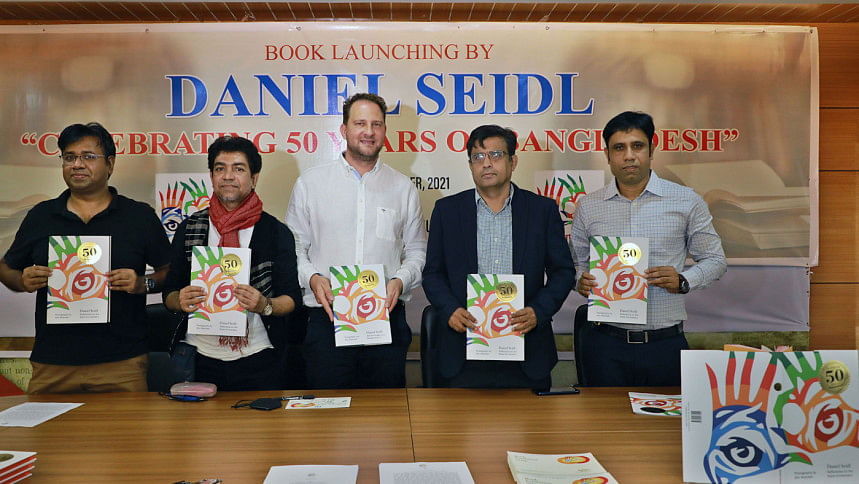RMG workplace safety lauded

Bangladeshi garment factories are one of the safest workplaces in the world for developments recommended by foreign inspection and remediation platforms Accord and Alliance, said a German author yesterday.
Launching his book "Celebrating 50 years of Bangladesh" at Economic Reporters' Forum in Dhaka, Daniel Seidl was sharing his experience of staying and working in Bangladesh before and after the Rana Plaza building collapse in April 2013.
On the eve of the collapse, Seidl, the then executive director of the Bangladesh-German Chamber of Commerce and Industry (BGCCI), was leading a big German business delegation in Dhaka, highlighting Bangladesh's economic transformation.
However, the country's deadliest industrial accident took place at Savar the following morning and the German buyers sought to withdraw their business from Bangladesh citing the reputational risks posed on their brands, he said.
Seidl said to have urged not to do so, reasoning that Bangladesh had already invested a lot in the garment sector and the retailers and brands had also benefitted from the competitive prices and quality products from this apparel sourcing destination.
"It should not be a blame game and it should be a common game. Many people always talk about the negatives and I say you should be positive about Bangladesh. We need to grow together," he said.
He said Bangladesh was his second home for he had already spent half of his life, or 25 years, here as he very much loved the country for its environment, people and fabric of society.
Seidl, also a former anchor for CNN Germany's business news, was accorded the title "Brand Ambassador of Bangladesh" by Bangladesh's Ministry of Commerce for promoting and branding Bangladesh for decades.
The book is described to be an engaging, upbeat account of Seidl, describing the development and transformation of a country that had to fight hard for its liberty, emerging from the struggle for independence to become a global manufacturing hub with exceptional economic growth.
The author not only gave a general overview of facts worth knowing, but also addressed uncomfortable and future-relevant issues, albeit without raising an admonishing finger, it said.
"Bangladesh is portrayed as a poor country with natural disasters and bad working conditions. In this book we have gathered a list of 50 FACTS and 50 PERSONAL STORIES to present the success story of Bangladesh," it read.
"Pictures say more than a thousand words, and with this in mind, renowned photographer Abir Abdullah has enriched the book's chapters portraying this colourful and multifaceted land with realistic illustrations," it added.
This book has been endorsed and distributed by McKinsey & Company and amfori (former: Foreign Trade Association).
Abir Abdullah, Shafiqul Alam, Bangladesh bureau chief of the Agence France-Presse (AFP), and SM Rashidul Islam, general secretary to the ERF, also spoke at the ceremony.

 For all latest news, follow The Daily Star's Google News channel.
For all latest news, follow The Daily Star's Google News channel. 



Comments